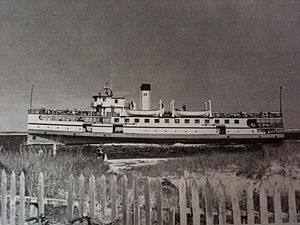Nobska (steamship)

The Nobska, possibly headed out of Nantucket harbor after just rounding Brant Point.
|
|
| History | |
|---|---|
| Name: | SS Nobska |
| Owner: | The Woods Hole, Martha's Vineyard and Nantucket Steamship Authority |
| Operator: | The Woods Hole, Martha's Vineyard and Nantucket Steamship Authority |
| Builder: | Bath Iron Works, Maine |
| Completed: | 1925 |
| In service: | 1925 |
| Out of service: | 1973 |
| Fate: | Scrapped in 2006 |
| General characteristics | |
| Tonnage: | 1,085 gross tons |
| Length: | 210 ft (64 m) |
| Beam: | 50 ft (15 m) |
| Draft: | 9 ft 3 in (2.82 m) |
| Installed power: | Steam (coal) |
| Propulsion: | Single screw |
| Speed: | 14 knots (26 km/h/16 mph) |
| Capacity: | 1,200 |
| Notes: | |
|
NOBSKA (steamship)
|
|
| Location | Inner harbor, Baltimore, Maryland |
| Area | 0 acres (0 ha) |
| Built | 1925 |
| Built by | Bath Ironworks |
| Architectural style | Sponson design |
| NRHP Reference # | 74002216 |
| Added to NRHP | May 2, 1974 |
The Nobska was a steamship that plied the waters of Nantucket sound as part of The Woods Hole, Martha's Vineyard and Nantucket Steamship Authority's fleet between 1925 and 1973 as a ferry. She was eventually scrapped in 2006 despite efforts to save her. She was America's last coastal steamer, had been on the National Register of Historic Places in Maryland, and had been considered one of America's 10 most endangered maritime resources by the National Maritime Alliance and National Trust for Historic Preservation.
Built in 1925 at the Bath Iron Works in Maine, the Nobska was named after Nobska Point, Woods Hole, on Cape Cod in Massachusetts.
Two hundred and ten feet long, she had a four-cylinder triple-expansion steam engine and could make 14 knots. She ran many different routes for the Steamship Authority over her decades of service for southeastern Massachusetts, mainly for the Cape and Islands but also including New Bedford.
Although launched as the Nobska, from 1928 to 1956 she was named the Nantucket. Since she was renamed Nobska in 1956, two other Steamship Authority vessels have had that name: the later Naushon, and the current Nantucket itself.
She was considered elegant and, at the time of her launch, modern, "the queen of the Sounds." In 2006 one reporter wrote that "She embodied style, grace and modern technology, and was an immediate hit with the Islanders she served," and that she was "beloved" by many during her years of service. In her later years she was "the grand lady of the ferry service."
...
Wikipedia
